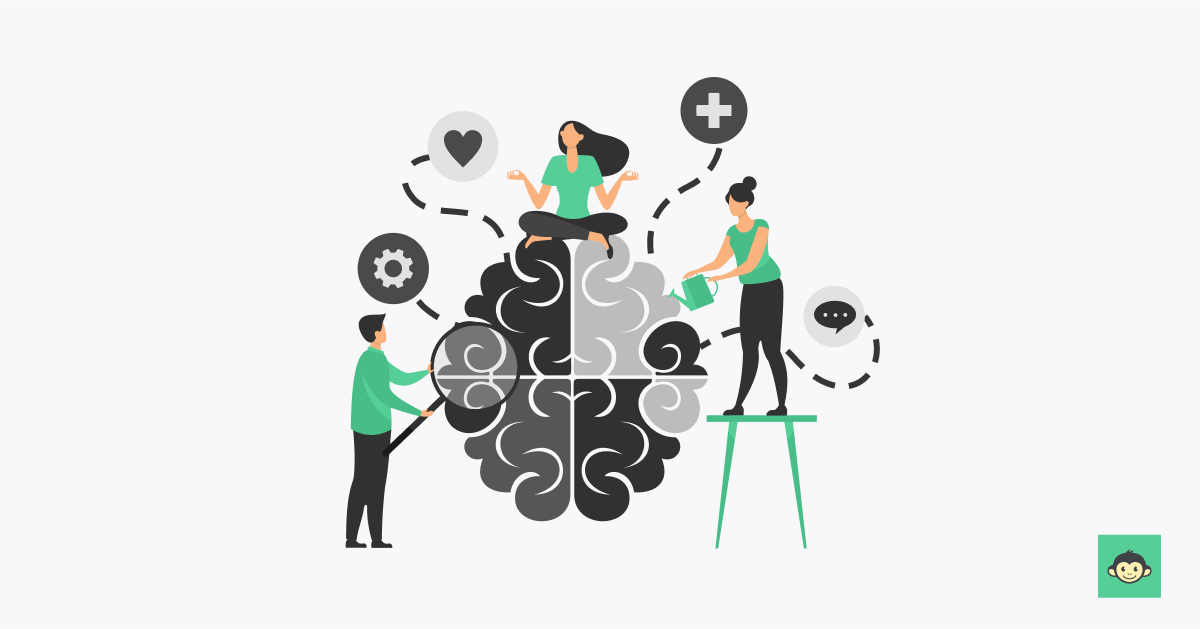What is mental health inclusion at work: Top benefits and strategies to create a healthy workforce

Imagine this: Bob, your colleague, starts the day like a deflated balloon. His energy is at an all-time low, and the whole office can sense it. But thanks to the organization’s proactive measures for mental health inclusion, Bob now has a toolkit of resources at his fingertips.
With a few clicks, he can access mental health resources, take a breather, and bounce back to his usual chipper self.
In this blog, we're going to venture into the world of mental health inclusion and how it intersects with the realm of employee engagement. We'll unravel the mysteries, share different models, and give you the inside scoop on how your organization can not only talk the talk but walk the walk when it comes to supporting your team's mental well-being.
What is mental health inclusion in the workplace?
Mental health inclusion in the workplace is a dynamic and progressive concept that aims to create an environment where all employees, regardless of their mental health status, feel valued, supported, and empowered.
It recognizes that mental health is an integral part of overall well-being and that fostering a culture of inclusion is essential to the success and happiness of both employees and the organization as a whole.
Organizations prioritizing mental health inclusion often see improved productivity, reduced absenteeism, and increased employee satisfaction. They understand that fostering an inclusive environment requires ongoing efforts, such as regular mental health workshops, flexible work arrangements, and open communication channels.
Creating a workplace that values mental health is an investment in the long-term success and resilience of both the workforce and the organization.
Furthermore, mental health inclusion extends beyond the workplace to community engagement. Companies that actively participate in mental health advocacy contribute to the broader societal shift toward destigmatizing mental health issues.
By partnering with mental health organizations and supporting community initiatives, organizations can make a positive impact on the well-being of their employees and the community at large.
In a nutshell, mental health inclusion in the workplace is breaking down the stigma surrounding mental health issues and making sure that employees at every level of the organization are not only aware of the importance of mental health treatment and well-being but also encouraged to participate in initiatives that support it actively.
7 Benefits of having a mental health inclusion approach at work

A mental health inclusion approach at work isn't just a feel-good initiative; it's a strategic move that can benefit both employees and the organization as a whole. It leads to a more supportive, productive, and sustainable work environment, ultimately contributing to the success and well-being of all stakeholders. Here are some of the major benefits it brings.
- Improved employee well-being: By fostering a culture that values mental health, employees are more likely to experience reduced stress and anxiety. They have access to resources and support that help them manage their mental well-being effectively.
- Enhanced productivity: Data shows that 89% of employees who support mental health issues believe it's affecting their work life. It shows why employees need to be mentally well and supported, resulting in more focus and productive. Reduced absenteeism and presenteeism (being at work but not fully productive) lead to employee morale and improved overall productivity.
- Greater employee engagement: Mental health inclusion encourages employees to be more engaged with their work and the organization. Engaged employees are often more committed, innovative, and motivated to contribute their best to the company.
- Attraction and retention of talent: Organizations that prioritize mental health inclusion become more attractive to job seekers. They also tend to retain their top talent because employees appreciate a supportive and inclusive work environment.
- Reduction in stigma: Promoting open conversations about mental health reduces the stigma associated with mental health challenges. When the stigma around mental illness is reduced, employees are more likely to seek help when they need it.
- Cost savings: While investing in mental health programs and initiatives may seem costly, it often results in long-term cost savings. Reduced turnover, absenteeism, and the associated expenses can outweigh the initial investment.
- Legal and ethical compliance: Many regions have established laws and regulations related to mental health in the workplace. Implementing a mental health inclusion approach not only helps organizations comply with legal requirements but also demonstrates a commitment to ethical and socially responsible practices.
Why mental health is the next frontier of diversity inclusion?

In contemporary discourse on diversity and inclusion, mental health systems have emerged as the next frontier, demanding increased attention and strategic consideration.
This shift is underscored by several compelling reasons that affirm the centrality of mental health to a comprehensive and effective diversity and inclusion agenda.
Varied experiences and identities
Mental health intersects with various identities, including race, gender, sexual orientation, and socioeconomic status. Recognizing and addressing mental health within the broader context of diversity acknowledges the unique challenges faced by individuals with diverse identities.
By integrating mental health into diversity initiatives, organizations can ensure a more holistic and inclusive approach that caters to the multifaceted needs of their workforce.
Reducing stigma and fostering inclusivity
Incorporating mental health into diversity and inclusion efforts is instrumental in reducing the stigma associated with mental health challenges.
When organizations actively address mental health, it signals a commitment to fostering an inclusive environment where employees feel safe discussing their mental health concerns without fear of judgment or discrimination. Normalizing discussions about mental health creates a culture that values the well-being of every individual.
Intersectionality awareness
Mental health is profoundly influenced by intersecting identities. Acknowledging the intersectionality of mental health allows organizations to tailor their diversity and inclusion initiatives more effectively.
This involves understanding how various aspects of identity can influence mental health experiences and ensuring that interventions consider these nuances. An intersectional approach to mental health fosters a more comprehensive and equitable inclusion strategy.
Workplace accommodations and flexibility
Integrating mental health into diversity and inclusion initiatives prompts organizations to consider workplace accommodations and flexibility. Mental health challenges can impact individuals differently, requiring varied solutions.
By recognizing mental health as an integral part of diversity, organizations are prompted to create policies and practices that accommodate diverse mental health needs, such as flexible work arrangements, wellness programs, and access to counseling services.
Promoting a culture of belonging
Mental health inclusion contributes to fostering a sense of belonging within the workforce. When organizations prioritize the mental well-being of employees, it sends a powerful message that every individual is valued and supported.
This, in turn, enhances overall employee morale, engagement, and satisfaction, creating a workplace where everyone feels a sense of belonging.
Enhancing employee productivity and resilience
Mental health is intricately linked to employee productivity and resilience. By addressing mental health as a facet of diversity and inclusion, organizations can create an environment where employees are equipped with the tools and support needed to navigate challenges effectively.
This, in turn, contributes to enhanced productivity, creativity, and resilience across the workforce.
What are mental health inclusion models?

Mental health inclusion models are structured frameworks and strategies that organizations can implement to create a workplace environment where mental health is valued, supported, and integrated into all aspects of the organization's culture.
These models serve as blueprints for promoting mental health awareness, reducing stigma, and providing resources to employees. Several mental health inclusion models have emerged over the years, and they continue to evolve. Here are a few notable models:
1) The national standard of Canada for psychological health and safety in the workplace
This model provides a comprehensive framework for organizations to promote psychological health and safety. It focuses on prevention, early intervention, and providing support to employees. It outlines guidelines, tools, and resources for employers to create a mentally healthy workplace.
2) The mental health continuum model
Developed by the Canadian Armed Forces, this model categorizes individuals into four groups: healthy, reacting, injured, and ill. It guides organizations in identifying where employees fall on this continuum and tailoring support and interventions accordingly.
3) The thrive-at-work model
This model, developed in the UK, emphasizes the role of leadership in promoting employee well-being. It encourages leaders to create a positive work environment and offers practical guidance for organizations to promote mental health through leadership, transparency, and cultural change.
4) The mental health at work commitment
Launched by the UK government, this model encourages organizations to publicly commit to taking action on mental health in the workplace. It provides a framework for organizations to address mental health issues, including creating a supportive culture and improving mental health awareness.
5) The mental health first aid model
This model focuses on training individuals within the organization to provide initial support to someone experiencing a mental health crisis. It equips employees with the skills and knowledge to offer immediate assistance until professional help is available.
6) The zero suicide model
Originating in healthcare settings, this model aims to reduce suicide rates by creating a culture that prioritizes suicide prevention. It focuses on identifying individuals at risk, providing support, and creating a comprehensive approach to suicide prevention.
7) The whole-person wellness model
This holistic model encourages organizations to view employees as whole individuals with physical, mental, and emotional well-being. It emphasizes the importance of offering programs that address various aspects of wellness, including nutrition, fitness, and mental health.
Is mental health included in DEI?
Yes, mental health is increasingly being included in Diversity, Equity, and Inclusion (DEI) initiatives. Many organizations recognize that mental health is an essential component of overall diversity and inclusion efforts, as it's crucial to support employees of all backgrounds, including those facing mental health challenges.
By addressing mental health within DEI frameworks, organizations aim to create a more inclusive and equitable workplace that values and supports mental health benefits and the well-being of all employees.
Why is diversity and inclusion important in mental health?

The Mental Health Foundation reports that 14.7% of employees in the workplace are suffering from mental health problems. This makes incorporating diversity and inclusion into mental health efforts lead to more comprehensive and equitable support for all individuals, ultimately promoting better mental health outcomes. Here’s what makes it critical:
- Varied experiences: People from diverse backgrounds may have unique mental health experiences and needs. Especially women, as data shows that when they are working full-time, the chances to have mental health problems are almost twice as likely than their male counterparts.
- Reducing stigma: Inclusive environments reduce the stigma associated with mental health challenges. When diverse voices share their experiences, it helps normalize discussions about mental health.
- Access to support: Inclusive practices ensure that all individuals, regardless of their background, have equal access to mental health services, resources, and support.
- Better solutions: A diverse workforce can bring a wider range of perspectives and innovative solutions to mental health challenges, leading to more effective support strategies.
- Overall well-being: Promoting diversity and inclusion fosters a sense of belonging, which can positively impact overall mental well-being by reducing stress and enhancing emotional support.
- Cultural competence: Understanding diverse cultural perspectives allows for more tailored and effective mental health interventions, acknowledging the nuances in individual experiences and promoting a more inclusive approach to treatment.
- Intersectionality awareness: Inclusive mental health practices consider how different aspects of a person's identity may intersect and influence their mental health, ensuring that interventions are comprehensive and sensitive to diverse needs.
- Representation matters: Having diverse role models in mental health professions and advocacy efforts is vital. Representation fosters a sense of validation and encourages individuals from diverse backgrounds to seek help without fear of judgment, as they can relate to professionals who understand their unique challenges.
- Inclusive policies: Implementing policies that address the specific mental health needs of diverse populations is crucial. This includes considerations for different cultural norms, family structures, and socio-economic factors, ensuring that mental health initiatives are accessible and effective for everyone.
Retaining talent with mental health initiatives

In today's competitive business landscape, organizations are increasingly recognizing the importance of retaining talented employees by fostering a workplace environment that prioritizes mental health initiatives.
Retaining talent is not solely contingent on traditional compensation packages; rather, it necessitates a comprehensive approach that acknowledges the well-being of employees, including their mental health.
Implementing mental health initiatives serves as a strategic investment in retaining a skilled workforce. When employees perceive their organization's commitment to mental well-being, it contributes to a positive work culture, fostering loyalty and commitment.
Moreover, such initiatives signal an organization's understanding of the evolving needs of its workforce, reinforcing the notion that employees are valued beyond their professional contributions.
A workplace that prioritizes mental health initiatives demonstrates a commitment to creating a supportive and inclusive environment. This commitment, in turn, significantly impacts employee morale, job satisfaction, and overall engagement.
Employees who feel supported in their mental health are more likely to be productive, innovative, and resilient in the face of challenges. Beyond the immediate benefits, organizations that invest in mental health initiatives also mitigate the risk of talent attrition.
Employees are more inclined to remain with an organization that actively addresses their holistic well-being, recognizing that their employer is attuned to the nuanced challenges of the contemporary workforce.
Importance of mental health and social inclusion at work

Mental health and social inclusion in the workplace hold immense importance as they intersect to create a healthier, more productive, and equitable work environment. Recognizing and supporting the mental well-being of employees is not just a matter of goodwill; it's a strategic imperative for organizations.
A workplace that prioritizes mental health acknowledges that employees' psychological well-being significantly impacts their performance and overall job satisfaction. By fostering an environment where mental health concerns are openly discussed and supported, employees are more likely to thrive.
Moreover, social inclusion plays a vital role in this context. Inclusion ensures that every employee, regardless of their background or personal circumstances, feels valued and part of a cohesive team. It reduces feelings of isolation and loneliness, which can negatively impact mental health. Inclusive workplaces foster a sense of belonging, where everyone can contribute their best.
By promoting mental health and social inclusion, organizations not only enhance the overall well-being of their employees but also boost productivity, reduce turnover, and attract and retain top talent.
This creates a positive feedback loop where a mentally healthy and inclusive workplace becomes a competitive advantage and a hallmark of responsible and compassionate corporate culture.
Inclusion of mental health support for employers
Comprehensive training programs
Employers should invest in comprehensive training programs to educate all staff members on mental health awareness, recognizing signs of distress, and fostering a supportive environment.
This equips employees with the tools to identify and respond to mental health challenges in a compassionate and informed manner.
Accessible resources and services
Ensure that mental health resources and services are readily accessible to all employees. This includes establishing confidential counseling services, helplines, and partnerships with mental health professionals.
Accessibility removes barriers to seeking support and reinforces a commitment to the well-being of the workforce.
Inclusive policies and practices
Implement inclusive policies that explicitly address mental health considerations. This involves developing flexible work arrangements, accommodating mental health-related leaves, and promoting a culture where employees feel comfortable discussing their mental health needs without fear of discrimination or reprisal.
Promoting diversity and inclusion
Acknowledge the intersectionality of mental health and diversity. Promoting an inclusive environment involves recognizing the unique challenges faced by individuals with diverse backgrounds and identities.
This includes cultural competence training and initiatives that address the specific mental health needs of different demographic groups within the workforce.
Leadership commitment and advocacy
Leadership plays a pivotal role in fostering an inclusive mental health culture. Employers should visibly demonstrate their commitment to mental health initiatives, not only through policies but also through active advocacy.
Senior leaders can share personal experiences, participate in mental health events, and champion the importance of mental well-being at all levels of the organization.
Regular check-ins and feedback mechanisms
Establish regular check-ins with employees to assess the effectiveness of mental health initiatives. Create anonymous feedback mechanisms to encourage open communication about mental health support.
This ensures continuous improvement and adaptation of strategies based on the evolving needs of the workforce.
Workplace accommodations
Recognize and accommodate the diverse mental health needs of employees. This may involve providing quiet spaces, flexible work hours, or reasonable adjustments for individuals dealing with mental health challenges.
Customized accommodations demonstrate a commitment to inclusivity and contribute to a more supportive workplace.
Community engagement and advocacy
Extend mental health support beyond the workplace by engaging with community initiatives and advocating for mental health awareness.
Employers can contribute to reducing societal stigma, promoting understanding, and supporting broader mental health initiatives, creating a positive impact on both the workforce and the community at large.
How to promote mental health inclusion at work: 5 Strategies

Promoting mental health inclusion at work requires a thoughtful and comprehensive approach. Here are five effective strategies to foster a mentally healthy and inclusive workplace:
- Education and training: Provide mental health education and training for all employees. This can include workshops, webinars, or online resources to increase awareness about mental health issues, reduce stigma, and help colleagues recognize signs of distress in others.
- Accessible resources: Make mental health resources readily available. Offer access to counseling services, employee assistance programs, employee resource groups, and information about local mental health support networks. Ensure that employees know how to access these resources confidentially.
- Inclusive policies: Develop and implement policies that support mental health inclusion. These policies might include flexible work arrangements, paid mental health leave, or reasonable accommodations for employees with mental health conditions.
- Leadership support: Encourage leadership to support mental health inclusion actively. When leaders set a positive example by discussing their own well-being and supporting employees openly, it sends a powerful message that mental health care is a priority.
- Engage in open conversations: Create a culture of open dialogue about mental health. Encourage employees to share their experiences and provide feedback on what the organization can do to support their mental health better. This fosters a sense of belonging and trust.
Mental health and social inclusion impact factor at workplace

In contemporary workplaces, recognizing the symbiotic relationship between mental health and social inclusion is essential for fostering a thriving and supportive professional environment.
The impact of mental health on social inclusion, and vice versa, is a critical factor that significantly influences overall workplace dynamics and employee well-being.
- Enhanced productivity and engagement: When employees experience social inclusion, it positively influences their mental health, leading to increased productivity and engagement. A sense of belonging and connection within the workplace fosters a conducive atmosphere for collaboration and innovation.
- Reduced stigma surrounding mental health: Socially inclusive environments contribute to breaking down the stigma associated with mental health. Open conversations and supportive relationships among colleagues create a culture where individuals feel comfortable discussing mental health challenges, ultimately promoting a healthier workforce.
- Diverse perspectives and problem-solving: Socially inclusive workplaces often boast a diverse workforce. This diversity extends to different perspectives on mental health, facilitating innovative problem-solving approaches. A range of viewpoints contributes to more comprehensive and effective strategies for mental health support.
- Improved employee morale and well-being: Social inclusion serves as a catalyst for improved employee morale. When individuals feel socially connected, it positively impacts their mental well-being, creating a harmonious workplace where employees are more likely to experience job satisfaction and reduced stress.
- Enhanced resilience to work-related stressors: Socially connected employees are better equipped to navigate work-related stressors. A supportive social network provides a buffer against the challenges of the workplace, enhancing employees' resilience and ability to cope with stress effectively.
- Positive organizational culture: The impact of mental health and social inclusion extends to shaping the overall organizational culture. A workplace that prioritizes both aspects establishes a positive and inclusive culture, attracting and retaining top talent while contributing to the long-term success of the organization.
Significance of mental health surveys at work in gauging and improving mental health inclusion

Mental health surveys at work are invaluable tools for gauging and improving mental health inclusion. They provide a quantitative and qualitative understanding of employees' mental well-being, uncovering areas that may require attention.
These surveys enable organizations to identify specific challenges, track changes over time, and tailor their mental health inclusion initiatives accordingly. By listening to employee feedback and using data-driven insights, employers can create a more supportive and inclusive workplace, ultimately enhancing employee well-being, productivity, engagement, and retention.
Conclusion
Mental health inclusion at work is not just a moral imperative; it's a strategic imperative. By prioritizing mental well-being, organizations can create a thriving, equitable, and productive workplace where every employee feels valued and supported.
Through diverse inclusion strategies, mental health education, and open conversations, companies can champion a culture where mental health is everyone's business. The benefits are far-reaching, from reduced stigma and increased productivity to attracting and retaining top talent. It's a journey towards a brighter, more inclusive future where mental health is not a barrier but a bridge to success.



